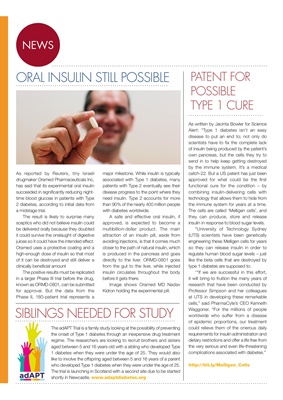
NEWS
CGMS FOR
TYPE 2S
As reported by Reuters, tiny Israeli
drugmaker Oramed Pharmaceuticals
Inc said its experimental oral insulin
succeeded in significantly reducing nighttime blood glucose in patients with Type
2 diabetes, according to initial data from
a midstage trial.
The result is likely to surprise many
skeptics who did not believe insulin could
be delivered orally because they doubted
it could survive the onslaught of digestive
juices so it could have the intended effect.
Oramed uses a protective coating and a
high-enough dose of insulin so that most
of it can be destroyed and still deliver a
clinically beneficial amount
The positive results must be replicated
in a larger Phase III trial before the drug,
known as ORMD-0801, can be submitted
for approval. But the data from the
Phase II, 180-patient trial represents a
SIBLINGS NEEDED FOR RESEARCH
The adAPT Trial is a family study looking at the possibility of preventing the onset of Type 1
diabetes through an inexpensive drug treatment regime.
The researchers are looking to recruit brothers and sisters aged between 5 and 16 years
old with a sibling who developed Type 1 diabetes when they were under the age of 25. They
would also like to involve the offspring aged between 5 and 16 years of a parent who developed
Type 1 diabetes when they were under the age of 25. The trial is launching in Scotland with a
second site due to be started shortly in Newcastle.
www.adaptdiabetes.org
ORAL INSULIN STILL POSSIBLE
major milestone. While insulin is typically
associated with Type 1 diabetes, many
patients with Type 2 eventually see their
disease progress to the point where they
need insulin. Type 2 accounts for more
than 90% of the nearly 400 million people
with diabetes worldwide.
A safe and effective oral insulin, if
approved, is expected to become a
multibillion-dollar product. The main
attraction of an insulin pill, aside from
avoiding injections, is that it comes much
closer to the path of natural insulin, which
is produced in the pancreas and goes
directly to the liver. ORMD-0801 goes
from the gut to the liver, while injected
insulin circulates throughout the body
before it gets there.
Image shows Oramed MD Nadav
Kidron holding the experimental pill.
Medtronic his to work with Qualcomm Life
to develop a new generation of smaller,
affordable continuous glucose monitors
(CGMs) for people with Type 2 diabetes
(as well as those with Type 1). Currently,
CGM devices are mostly prescribed for
people with Type 1 diabetes, while those
with Type 2 are more likely to use discrete
finger-prick glucometers. However,
this new partnership aims to leverage
Qualcomm's expertise to develop CGMs
that are smaller, easier to use, and more
affordable than currently available CGMs
-- in the hopes of making the technology
available to those with Type 2 diabetes.
There are 20 times more people with Type
2 diabetes.
Qualcomm has worked with a number
of major healthcare companies to develop
device pilots over the last few years
including pharma companies Roche,
Novartis, and GSK while Medtronic has
embarked on a number of partnerships
within diabetes care, currently working
with Samsung to optimize the viewing of
CGM and pump data from its MiniMed
Connect offering, and with IBM Watson
to apply cognitive computing to data from
Medtronic's CareLink Connect system.
As reported in mobihealthnews.com